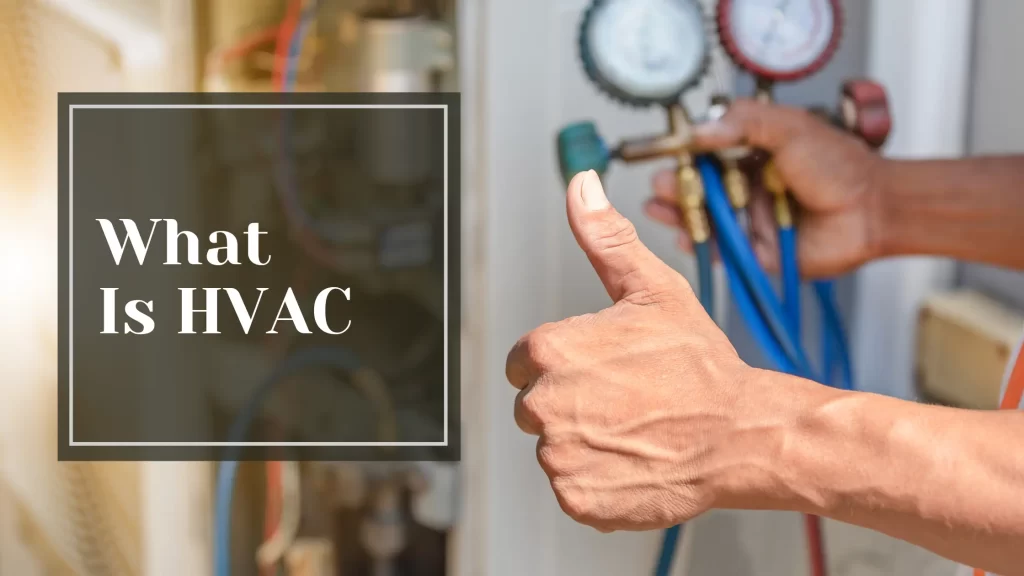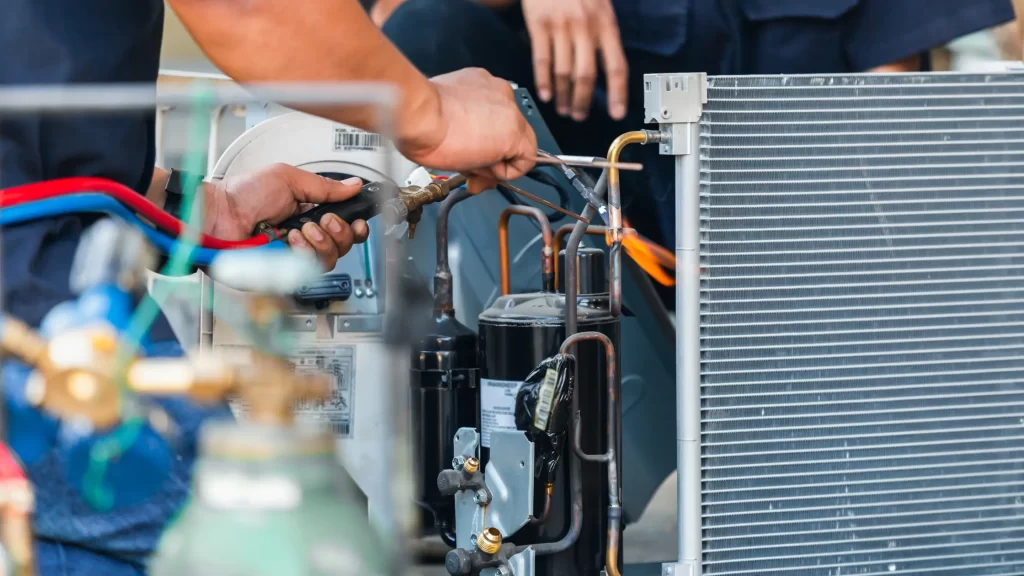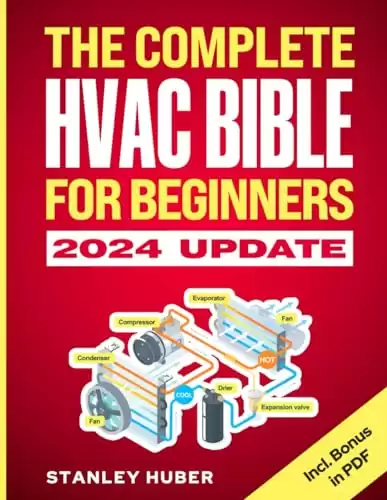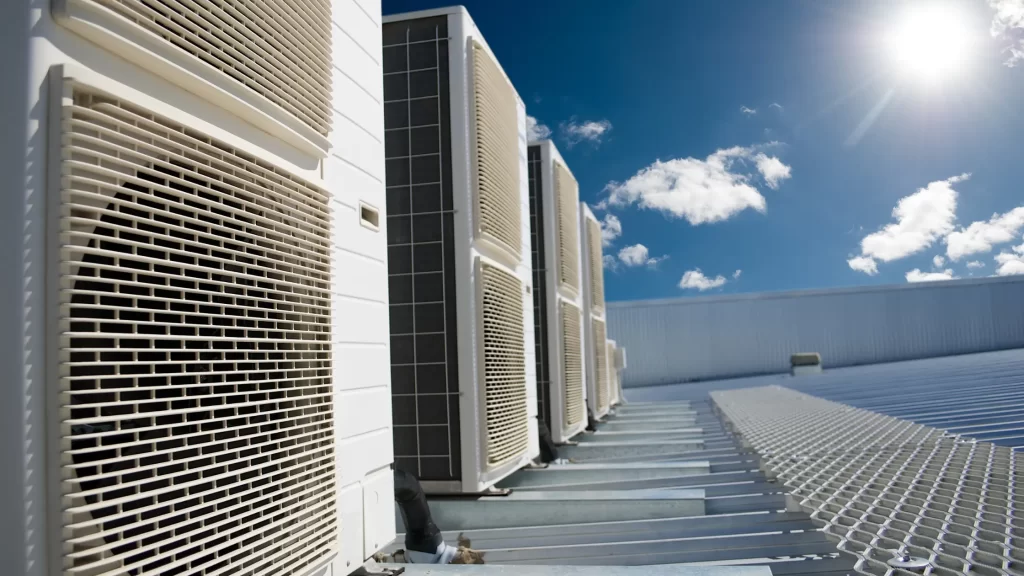As you consider starting a new career in the skilled trades, you may be wondering about the time commitment required for HVAC technician training. With many programs and options available, determining the length of the HVAC school is an important factor when researching how to gain entry into this growing field. In this article, you will find a comprehensive guide to HVAC program durations.
Table of Contents
ToggleHVAC Training Program Options
There are several options available for HVAC training. The specific program you choose will depend on your current level of experience and the amount of time you want to commit.
- Certificate or diploma program: It is usually completed in 9 months to 2 years. It teaches basic skills in HVAC installation, maintenance, and repair. You will learn the basics of heating, air conditioning, and refrigeration systems. If you want to quickly ready yourself for an entry-level job, this program may be a good option.
- Associate’s degree: An associate’s degree in HVAC technology takes about two years and involves more detailed training on the subject. In addition to technical skills, coursework consists of general education classes. An associate’s degree offers more opportunities for career advancement and higher pay.
- Bachelor’s degree: The four-year HVAC engineering technology program results in a bachelor’s degree. This includes upper-level courses on HVAC design, operation, and management. People with a bachelor’s degree can become leaders such as project managers, facility managers, or instructors of HVAC systems.
- Apprenticeship: Generally an HVAC apprenticeship lasts four years; it combines paid on-the-job experience with classroom instruction. Apprentices must have a high school diploma and be at least 18 years old. A journey worker status arises from apprenticeship which is one of the best ways to start an HVAC career.
Length of HVAC Certificate Programs
HVAC programs typically offer both certificates and associate’s degrees. Certificate programs provide basic training for entry-level positions. They usually take between 6 to 12 months to complete. The specific duration depends on factors like the program format and number of courses.
Full-Time vs Part-Time
- Full-time certificate programs typically take 6 to 9 months and require attending classes for up to 8 hours a day, 5 days a week. Part-time programs usually take 9 months to a year but only require classes 2 to 3 days a week for up to 6 hours. Full-time programs allow for faster completion but require more of a time commitment. Part-time programs are more flexible but take longer.
Number of Courses
- The number of courses in the program also impacts the duration. Most HVAC certificate programs include 4 to 6 courses that cover areas like HVAC fundamentals, heating and cooling systems, refrigeration, and HVAC controls. More courses mean additional time is required to complete the necessary classroom hours and hands-on training.
Program Format
- Some schools offer accelerated or fast-track options that can be completed more quickly. For example, an accelerated full-time program may only take 6 months instead of 9. However, the shorter period requires more intensive study and attendance. The standard full-time and part-time options typically do not provide an accelerated pace.
Duration of HVAC Associate Degree Programs
HVAC associate degree programs typically take two years of full-time study to complete. These programs provide intensive, hands-on training in HVAC installation, maintenance, and repair.
Coursework
- The curriculum includes both general education requirements as well as technical HVAC courses. Students will take classes in areas such as thermodynamics, HVAC equipment, ductwork and piping systems, electrical systems, and safety standards. In addition to classroom lectures, students gain practical experience through lab work and internships.
Flexible Program Options
- Many schools offer flexible program options for those with work or family commitments. This includes part-time study and online or hybrid programs that blend online and on-campus classes. Some schools also have evening or weekend course offerings. These flexible options typically take longer to complete but provide a more convenient path to earning an associate degree.
Accreditation
- When choosing an HVAC program, look for one that holds accreditation from an organization like the Partnership for Air-Conditioning, Heating, Refrigeration Accreditation (PAHRA). Accredited programs meet high standards for quality and rigor. Graduates of accredited programs may also have an easier time finding work as HVAC technicians.
Career Outlook
- According to the U.S. Bureau of Labor Statistics, employment opportunities for HVAC technicians and installers are expected to grow 13% between 2016 to 2026, faster than average for all occupations. Earning an associate degree in HVAC technology can prepare you for a career as an HVAC technician, installer, or mechanic. These roles provide stable employment and good earning potential.
Dive into 'The Complete HVAC BIBLE for Beginners,' your ultimate guide to mastering HVAC systems. From installation to troubleshooting, this updated manual covers it all for both residential and commercial use. Ideal for beginners and experienced technicians seeking comprehensive expertise.
Time Commitment for HVAC Bachelor’s Degrees
Typical Program Length
Bachelor’s degrees in HVAC typically take 4 years of full-time study to complete. The programs usually require students to complete 120-128 credit hours of coursework. Some schools may allow students to complete the program on an accelerated timeline of 3-3.5 years. Part-time or online programs will take longer to finish.
The time required for an HVAC bachelor’s degree will depend on several factors, including the school, program requirements, and whether students have any transfer credits. Some programs may require internships, fieldwork, or capstone projects that add to the total time commitment. Students should carefully evaluate program requirements to determine the necessary time investment.
Course Load
A typical bachelor’s program requires students to take 15-18 credit hours per semester to graduate on time. The course load will include a mix of HVAC-specific courses, general education requirements, and electives. HVAC courses usually make up 50-70% of the curriculum.
General education and elective courses provide a well-rounded education but do require a substantial time commitment. Students should plan to spend 2-3 hours of study time outside of class for every hour of lecture. With 15-18 credit hours, that amounts to 30-54 hours of coursework per week during the semester.
Scheduling Considerations
When determining if they can commit the necessary time, students should consider their work schedules and other responsibilities. Bachelor’s programs usually require some daytime courses, so night or part-time work may need to be reduced. Students should also plan for time off work or other commitments for internships if required.
However, online or hybrid programs might offer more flexibility – students have to spend enough time studying to succeed in their coursework. Achieving this balance requires good time management skills as well as proper planning for work, and life, and an HVAC bachelor’s degree. Hard work combined with determination however makes it possible for many students to complete their degrees while still performing other duties.
How Long Is HVAC School
HVAC technician programs, as you know now, can last from six months to two years depending on the type of program, degree conferred, and covered curriculum. The investment in time is worth it when considering good job prospects, decent pay, and manual work. This information will enable you to choose the best HVAC course for your objectives and timeline. The heating, ventilation, and air conditioning field requires skilled technicians while a quality education is its first step. Weigh all your options and go through what’s appropriate for you. Program length is only one aspect – your drive and commitment will take you there.
Frequently Asked Questions
How Long Does HVAC School Typically Last?
HVAC school durations vary depending on the program type. Certificate programs usually take 6 to 12 months, while associate’s degrees typically take about two years. Bachelor’s degrees require four years of study.
What Factors Affect the Duration of HVAC Training?
Several factors influence the length of HVAC school, including program format (full-time vs. part-time), number of courses, and program type (certificate, associate’s, or bachelor’s degree).
Can I Work While Attending HVAC School?
Yes, many HVAC programs offer flexible scheduling options, such as evening or weekend classes, allowing students to work while attending school. However, the time commitment for full-time programs may limit work hours.
Are Online HVAC Programs Available?
Yes, some schools offer online or hybrid HVAC programs, allowing students to complete coursework remotely. These programs provide flexibility but may take longer to complete than traditional on-campus programs.
What Are the Career Prospects After Completing HVAC School?
Graduates of HVAC programs can pursue careers as technicians, installers, or mechanics in the heating, ventilation, and air conditioning field. According to the U.S. Bureau of Labor Statistics, employment opportunities are expected to grow 13% between 2016 to 2026.










